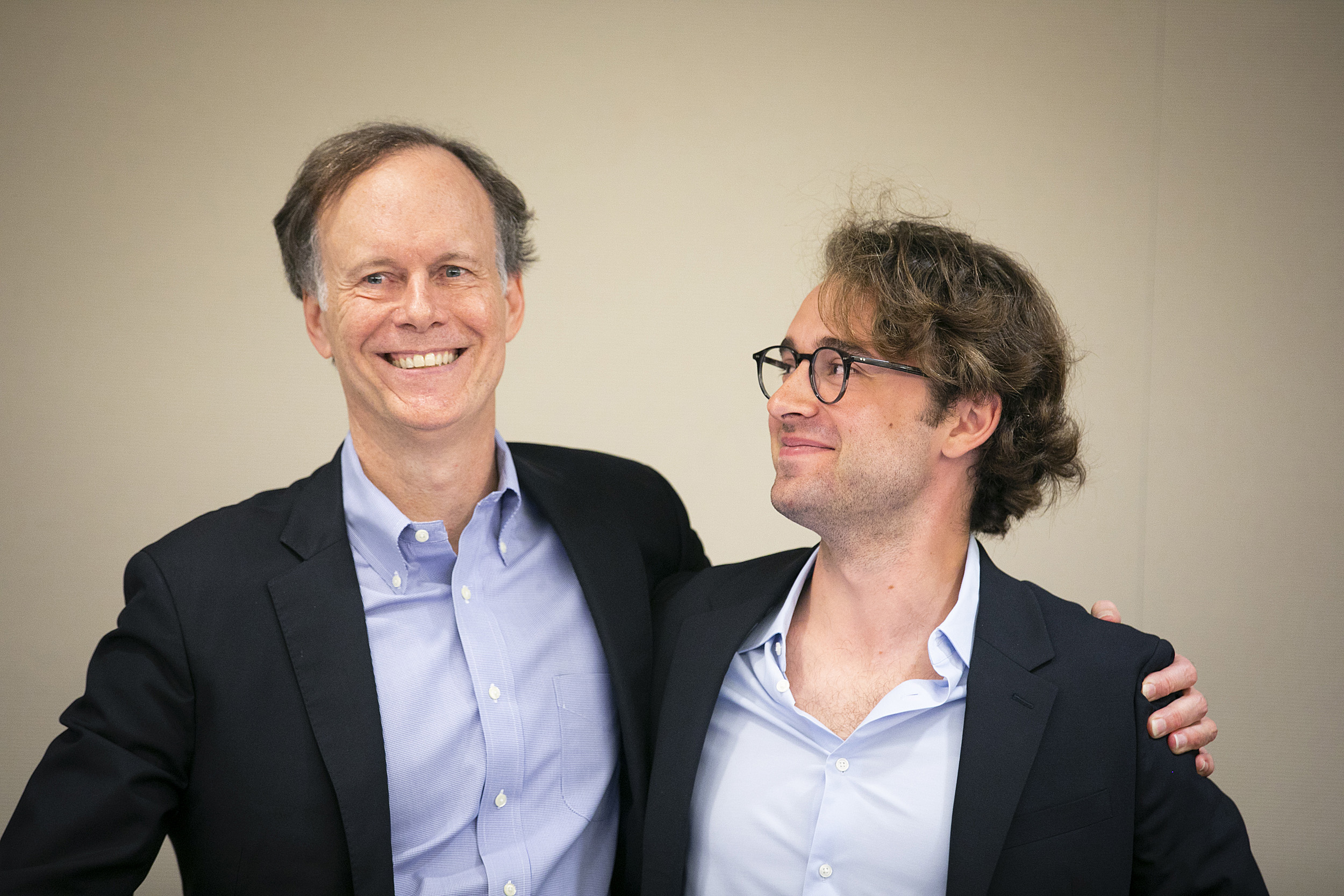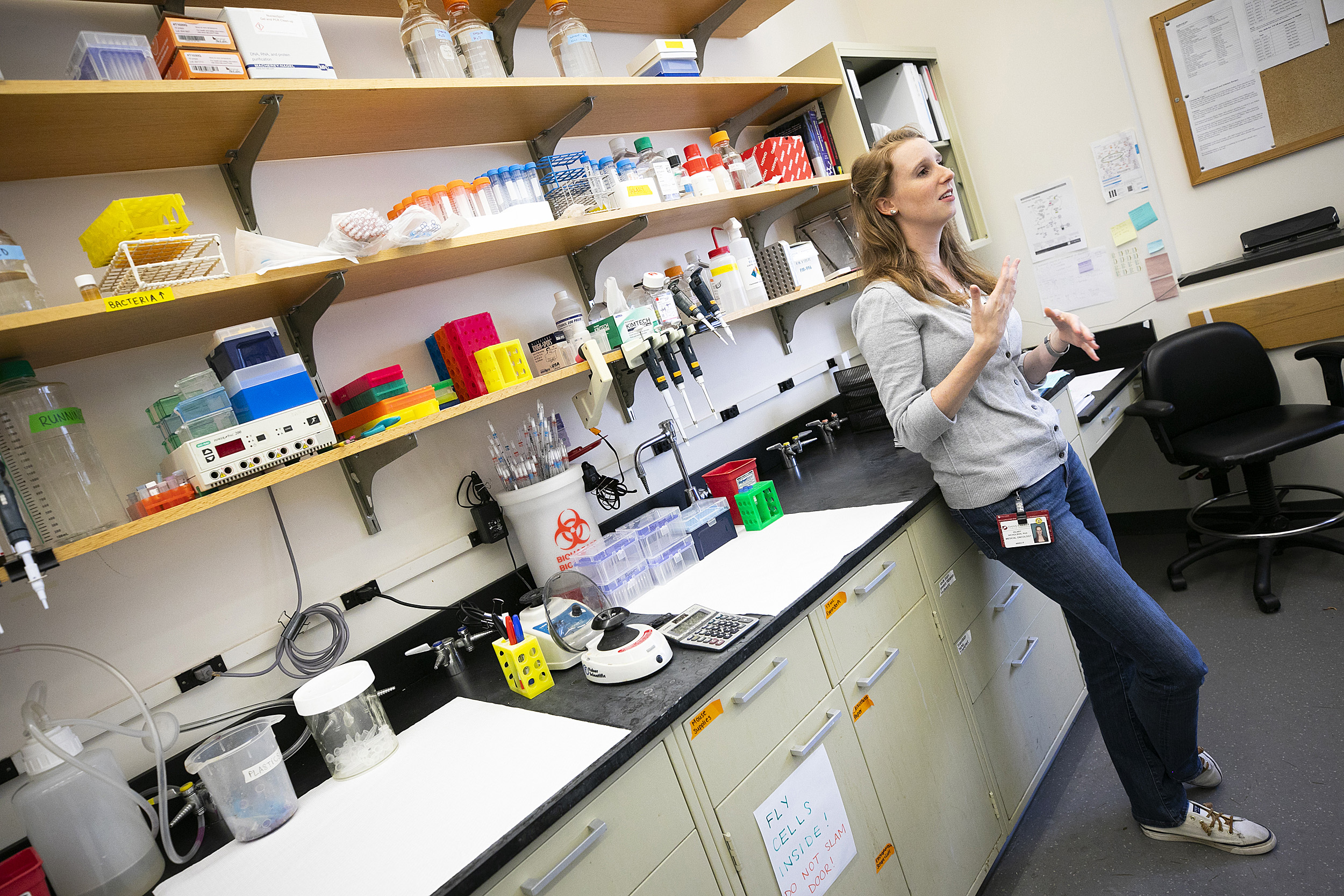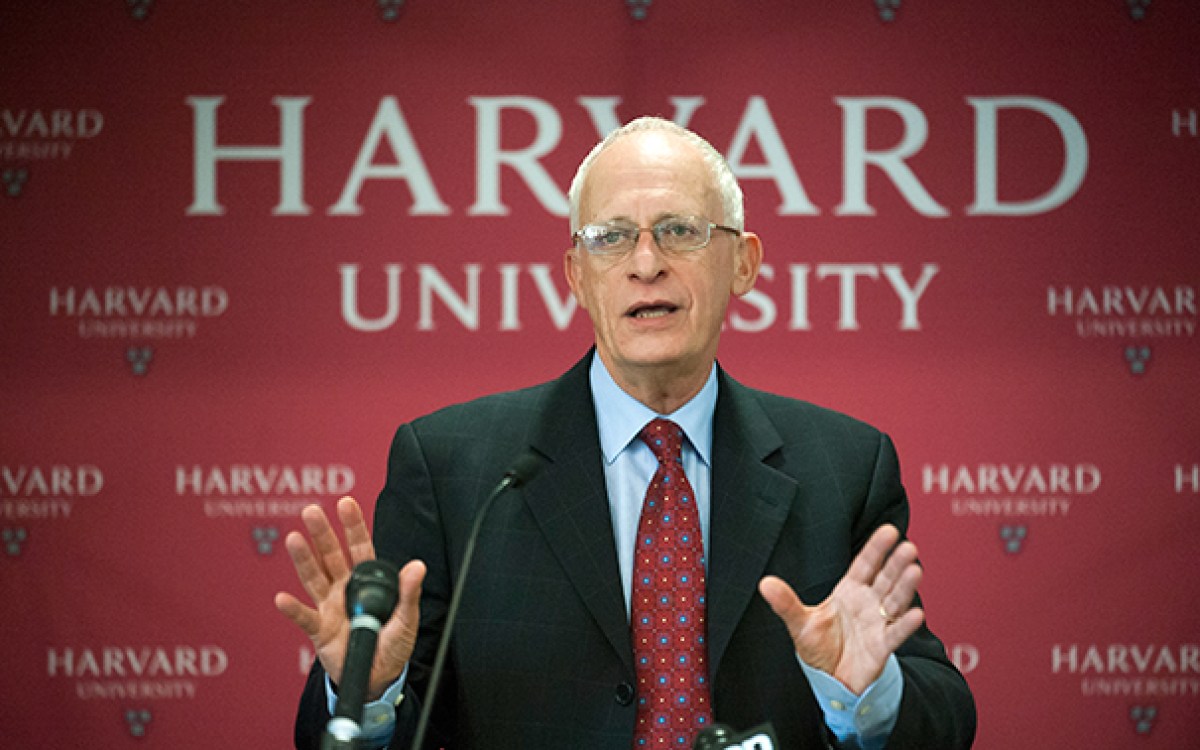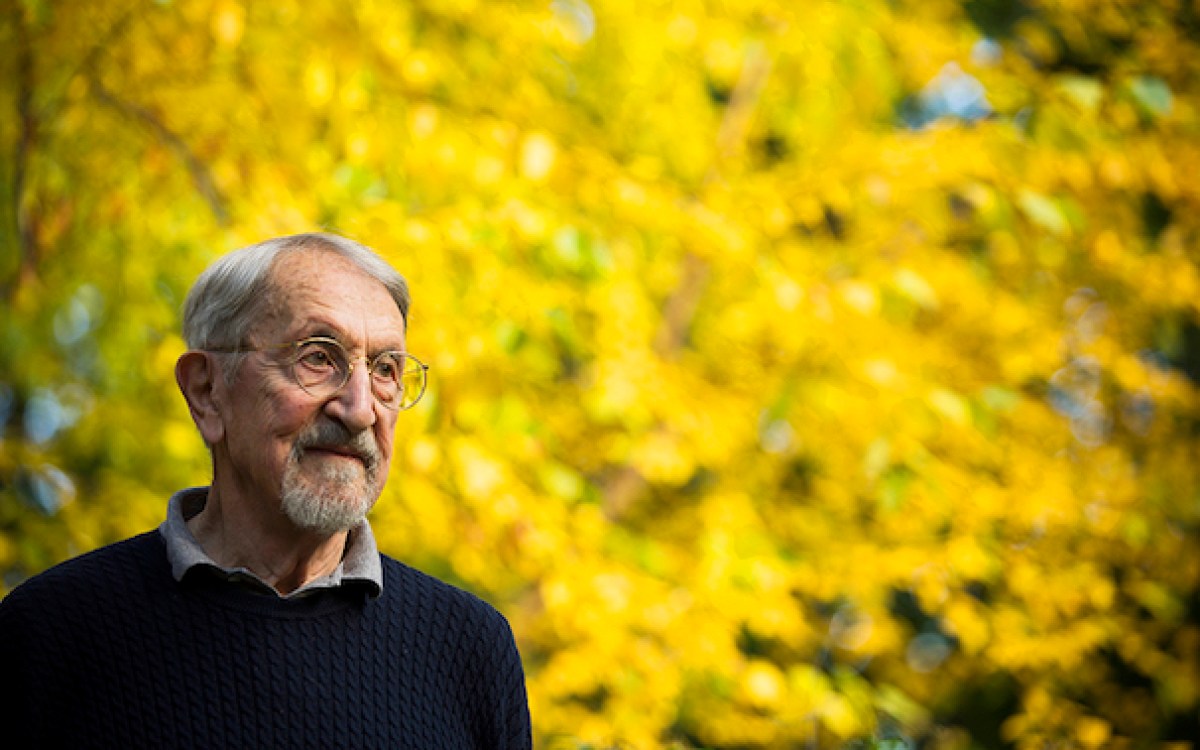
Harvard Medical School Professor William G. Kaelin Jr. was named one three recipients for the Nobel Prize in physiology or medicine. “My heart started racing, I was overwhelmed,” he said of hearing the news.
Photos by Stephanie Mitchell/Harvard Staff Photographer
The magic of the unexpected
Nobel winner began with a destination in mind but found something important along the way
Every scientist starts out looking for one thing, but sometimes finds something else along the way.
On Monday, newly minted Nobel laureate William G. Kaelin described a decades-long scientific journey that was like that. It started as an exploration of a condition that can lead to kidney cancer but resulted in a prize-winning discovery about how cells recognize and regulate the oxygen needed to survive, a discovery whose most tangible fruit is a drug to treat anemia.
“I’m a cancer biologist and a cancer physician, but the first truly unique thing coming out of my lab was for anemia,” Kaelin said during a late-morning news conference at the Dana-Farber Cancer Institute in Boston.
The unexpected application shows the importance of basic research and curiosity-driven science — undervalued today in a culture that often wants to know what results to expect before the work is underway, and leaves little room to pursue the unknown, Kaelin said.
Kaelin, the Sidney Farber Professor of Medicine at Harvard Medical School and the Dana-Farber Cancer Institute, learned in a phone call from Stockholm at 4:50 a.m. that he had won the 2019 Nobel Prize in physiology or medicine. In a humorous and poignant telling, Kaelin recounted the story of his discovery, the science, and the importance of those around him, particularly his late wife, Carolyn, a breast cancer surgeon and an inspiration to him. She died of a brain tumor in 2015.
“I like to think she’s smiling and nodding, ‘I told you, I told you this was going to happen!’” said Kaelin, who is also a senior physician at Brigham and Women’s Hospital and an investigator at the Howard Hughes Medical Institute.

The Nobel committee recognized Kaelin, Sir Peter J. Ratcliffe of the Francis Crick Institute in London, and Gregg L. Semenza ’78 of Johns Hopkins University “for their discoveries of how cells sense and adapt to oxygen availability.” The work centers around two main molecules, called VHL — the focus of Kaelin’s work — and HIF. Together, they found that VHL works like a cellular garbage disposal, destroying HIF molecules when oxygen is plentiful in the cell. When oxygen levels drop, HIF builds up, signaling stress to the body and triggering a response that can include producing more red blood cells and growing new blood vessels. In 2001, Kaelin and Ratcliffe simultaneously found the missing link between the chemical reactions and oxygen levels, a process that, when oxygen is plentiful, chemically tags HIF for destruction.
In the years since, Kaelin said, similar pathways have been found in an array of animals, indicating it is evolutionarily conserved, a sign of its importance to survival.
Kaelin cut his scientific teeth in the lab of David Livingston, the Emil Frei III Distinguished Professor of Medicine at Dana-Farber. He arrived in 1987 after finishing medical school at Duke University and a residency at Johns Hopkins. Kaelin said Livingston mentored him during his postdoctoral fellowship and remains a mentor to this day. Livingston recalled Kaelin doing “spectacular work” in his lab, leaving him impressed with the clarity of the younger researcher’s scientific mind and his commitment to scientific rigor.

“I’m overjoyed — times 10 — but not surprised,” Livingston said of his friend’s good news. In the early 1990s, Livingston said, when Kaelin left the lab to start his own, it was an easy decision to keep him at Dana-Farber.
The heads of the three institutions with which Kaelin is affiliated had praise for the new laureate. Speaking at the morning news conference, Harvard Medical School Dean George Q. Daley said Kaelin’s story is an example of how clinical medicine can inform scientific discovery, describing him as the “finest medicine has to offer.”
“He is the consummate physician-scientist,” Daley said. “He is fiercely dedicated to rigor and excellence in both the laboratory and in the clinic.”
Dana-Farber President Laurie Glimcher said because oxygen regulation is so important to so many biological processes, understanding and being able to manipulate the pathway discovered by Kaelin and co-laureates may be transformative in a host of diseases, including cancer, heart disease, anemia, and macular degeneration.
Kaelin said that popular media commonly falsely depicts scientists as loners jealously guarding research results, but it was a spirit of collaboration that boosted the Nobel-winning discoveries and, more broadly, made the Boston area’s medical-scientific community such fertile ground for discovery.


“I learned years ago that I learn fastest when surrounded by people smarter than me. Science today is not done by an individual, but by an ecosystem,” Kaelin said at the afternoon press conference. Kaelin’s son, William “Tripp” Kaelin, joined his father at the press conference.
Though he didn’t collaborate directly with Semenza and Ratcliffe, they had a collegial relationship and would talk about the latest lab findings when they met at scientific gatherings, sharing work months before official scientific publication.
“I learned years ago that I learn fastest when surrounded by people smarter than me,” Kaelin said. “Science today is not done by an individual, but by an ecosystem.”
Kaelin has worked to create such an ecosystem in his lab, a series of rooms on the fourth floor of the Mayer Building. The rooms, containing laboratory benches crowded with equipment, host 10 to 15 postdoctoral fellows at a time working on related projects.
“One of the great things about Bill’s discovery is that it’s been translatable, and it’s fundamental, and it’s stood up against the test of time,” said postdoc fellow Hilary Nicholson, pictured in Kaelin’s lab at Dana-Farber Cancer Institute.

Hilary Nicholson, a fourth-year postdoctoral fellow whose work on a treatment for the most common kind of kidney cancer was recently on the cover of the journal Science Signaling, said Kaelin freely shares equipment with colleagues and selects people for his lab based not only on their interest in advancing science but also on their willingness to help others.
Nicholson said an important feature of their research is that it has potential applications that one day may help patients in the waiting rooms they pass each morning when they arrive at work.
“One of the great things about Bill’s discovery is that it’s been translatable, and it’s fundamental, and it’s stood up against the test of time. He always pursues the truth, very doggedly,” Nicholson said. “For me, it’s all about the patients waiting for you to come up with something amazing.”
With Kaelin’s Nobel, Harvard now has 49 current and former Harvard faculty members who are Nobel laureates. For a full list, visit the website.






